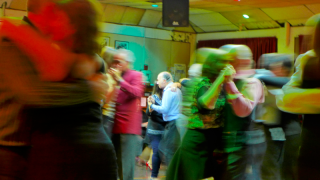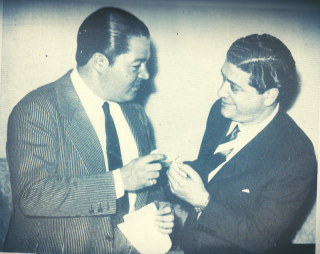 Tango word: CORRALÓN
Tango word: CORRALÓN
Part of speech: Noun
Appears in the tangos: Arrabalera, Tres esquinas, No te apures Carablanca, Barrio de tango, Manoblanca, and 52 others. (Links are to TangoDecoder versions of the songs.)
Though the word corralón appears in at least fifty-six tangos, it’s meaning isn’t immediately clear. None of the present day porteños I’ve asked recognize the word, or know what it means. It’s a bit old-fashioned, and not in current use. You might think it to be a variant of the word corral, an enclosure in which animals like horses, cows, or other farm animals are kept. And that is true in Uruguay; there, a small corral is sometimes called a corralón. But in the tango songs I’ve examined, the word corralón always has one of two meanings:
- a large multi-family house or tenement. (E.g., WordReference.com)
- a large yard; a timberyard. (E.g., ReversoDictionario.com)
The first usage is seen in the song Arrabalera composed by Sebastian Piana with lyrics by Catullo Castillo, and sung by Tita Merello in the film by the same name:
Mi casa fue un corralón
de arrabal bien proletario….
“My house was a real working-class tenement,” proclaims the song’s narrator, as she prepares to detail the long list of her credentials as an arrabalera, a gal from the arrabal, the outlying, working-class quarters of Buenos Aires. No, she wasn’t born in a corral, nor a barnyard, nor a pig-sty. She was born in a multi-family house or tenement, probably one of the famous conventillos (lit., “little convents”) of Buenos Aires.
The second usage, which is the more common by far in tango lyrics, is found in many familiar songs. Angel D’Agostino’s Tres esquinas (“Three corners”) is one example that many dancers will recognize by ear, since the word appears as the last word in the last line of the frequently-heard song:
Bajo el cielo de luna llena
duermen las chatas de corralón.
“Under the full-moon sky / sleep the flat-bed wagons of the timberyard.” Another key word in this passage is chata, which is a horse-drawn, flat-bed wagon that was used to haul timber and other goods. The two words often appear in the same verse. Las chatas de corralón were a common sight in the old arrabal.
A similar image is found in the second verse of No te apures Carablanca (Roberto Garza and Carlos Bahr):
Me achica el corazón
salir del corralón
porque me sé perdido.
Me tienta la ilusión
que ofrece el bodegón
en su copa de olvido.
“My heart sinks/shrinks as I leave the timber yard because I know I’m lost. The illusion of the bar tempts me with its cup of oblivion.”
One more, just for the fun of it. This one from Aníbal Troilo and Homero Manzi’s Barrio de tango:
Así evoco tus noches, barrio tango,
con las chatas entrando al corralón
y la luna chapaleando sobre el fango
y a lo lejos la voz del bandoneón.
That’s how I remember your nights, tango barrio,
with the flatbed wagons pulling into the timber yard,
the moon splashing in the mud,
and in the distance, the voice of the bandoneón.
By the way, the two main industries of the arrabal were ironworks and timberyards. The sound of the smith’s hammer striking the anvil, the saws rending huge logs into lumber, and the trotting horses pulling their chatas were the principle sounds of the arrabal, according to Horacio Salas in El Tango. That, and the sound of the bandoneón.
Do you have something to add about the word corralón? Feel free to leave a comment below….

 Here’s an index of all our English-language versions of tango, vals, and milonga lyrics. Just click on the title, and view the page. Many pages have face-to-face lyrics and subtitled videos.
Here’s an index of all our English-language versions of tango, vals, and milonga lyrics. Just click on the title, and view the page. Many pages have face-to-face lyrics and subtitled videos.





